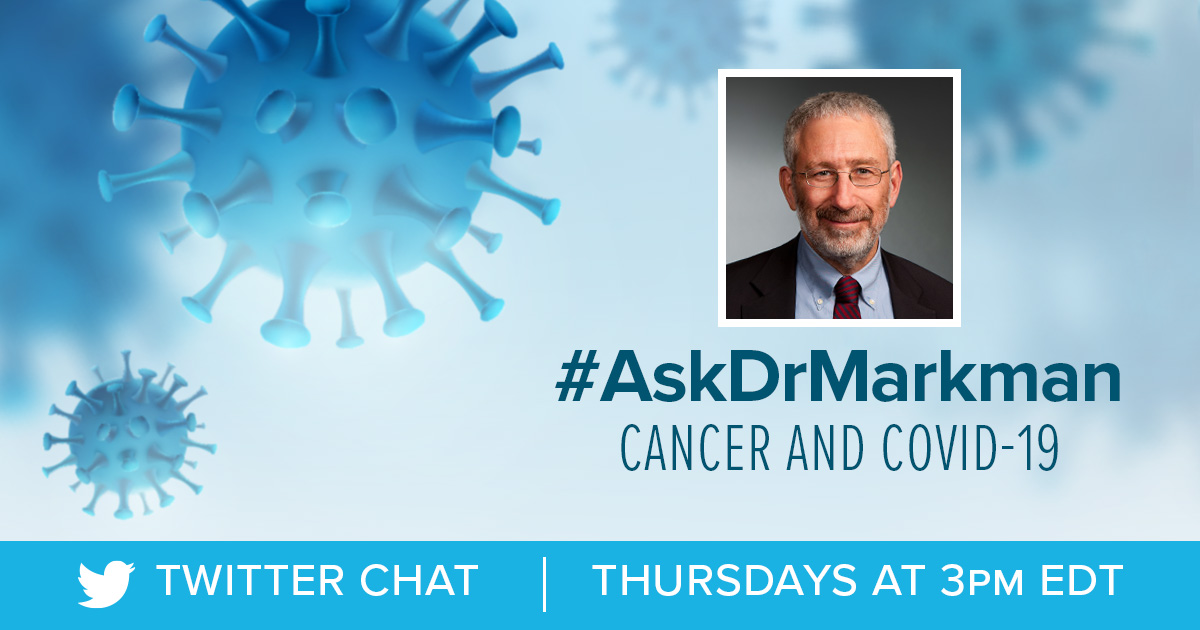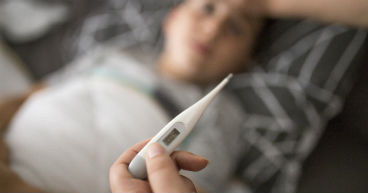
The COVID-19 pandemic has created a constantly evolving flow of new and sometimes confusing information. Cancer patients have many questions about how the virus may affect them, their access to ongoing treatments, their overall health and steps they can take to help reduce risk of infection. Maurie Markman, MD, President of Medicine & Science at Cancer Treatment Centers of America® (CTCA), has launched a weekly Q&A hosted on Twitter to answer your questions, in real time and as questions are sent to us online and by phone. Follow us on #AskDrMarkman. Here’s this week’s chat:
Question: As a cancer patient undergoing treatment, I’m concerned about being out in public right now. Is there any evidence that people are finally beginning to take recommendations for wearing masks seriously?
Answer: You are asking an important question, since wearing a mask in public and appropriate social distancing are the two most important steps the public can take to help end the COVID-19 pandemic. And the good news is that, yes, a recent U.S. Centers for Disease Control and Prevention (CDC) survey found that, in June, 76 percent of people surveyed reported they were wearing a mask in public, compared to 62 percent in March.
Q: I am a 15-year cancer survivor who also survived a recent bout with COVID-19. I was lucky. I only lost my sense of smell for a while, I but didn’t have other major symptoms. How common is my experience?
A: First, congratulations on your 15-year anniversary, and great news that you didn’t get seriously sick with the virus.
As we’ve learned more about the symptoms caused by COVID-19, it’s increasing clear that loss of smell can be a key symptom. In fact, a recent study reported that four of five patients with mild or moderate COVID-19 symptoms noted short-term loss of smell, and for one in 10 patients, loss of smell was their first symptom.
Another study found that those who lose their sense of smell and test positive for the virus are more likely to experience a mild or moderate case of COVID-19.
Q: My sister is a cancer patient, and we’re concerned about visiting her with our 8-year-old son, who’ll be starting school next month. What are the risks of a child becoming infected with COVID-19?
A: According to the CDC, children under 18 make up 2 percent of all U.S. COVID-19 cases. However, in California, they make up almost 10 percent of cases, and almost one in three children tested in Florida had the virus.
Q: I’m a prostate cancer survivor, and I’ve been told I may have an increased risk of becoming seriously ill with COVID-19 because I have Type A blood. Is that true?
A: Studies conducted in the early part of the pandemic did suggest that individuals with Type A blood had a somewhat greater risk, but recent studies have suggested that this is not the case.
Q: I’ve heard that COVID-19 has had a major impact on cancer treatments, screenings and other services. Is that just a United States problem, or is that impact being felt elsewhere around the world?
A: Unfortunately, it’s true that the pandemic has had a significant effect on cancer programs worldwide. One recent survey of cancer organizations around the world found that two of three respondents said their cancer screenings had been canceled. Another 59 percent reported an expected drop in urgent referrals for suspected cancer. The survey also noted almost half of organizations reported that pathology reports were taking longer, and two of three saw delays or cancellations for cancer surgeries.
Q: My brother was diagnosed with COVID-19 a month ago, and he remains very fatigued. Is this common?
A: We’re beginning to learn more about patients who have recovered from serious COVID-19 infections. One recent report from Italy involved 179 previously hospitalized patients who were followed for a mean of 60 days after their first symptoms. Only 13 percent had no symptoms, while 32 percent had one or two symptoms and 55 percent had at least three persistent symptoms. The most common symptoms were fatigue, shortness of breath, joint pain and chest pain. No patient had persistent fever.
Q: As a cancer patient, I am especially interested in the status of COVID-19 vaccine trials, since I don’t see myself feeling safe from the virus until we can be vaccinated against it. Can you share what you know about ongoing trials?
A: Your interest in this critical area is understandable. A recent report identified 23 candidate COVID-19 vaccines in clinical evaluation, with another 140 undergoing pre-clinical evaluation. Three vaccines will soon be entering definitive phase 3 trial status.
Q: I heard somewhere that a report of an early-phase trial of a COVID-19 vaccine has been published. Are the results promising?
A: Yes. A phase 1 trial involving 45 healthy adults (not infected with COVID-19) who received the vaccine revealed that, after two vaccinations, all participants had relatively high levels of neutralizing antibodies in their blood. Equally important, while side effects were common (fatigue, chills, headache and pain at injection site), they were not serious for the majority of participants.
Q: I am a 12-year cancer survivor, and I’m interested in participating in a COVID-19 vaccine trial. Will I be excluded because of my cancer history?
A: This is an important question that only the companies conducting the trials and the responsible drug regulatory agencies will be able to answer. But in my opinion, unless there’s some other contraindication, such as a problem with your immune system or other serious illness, your prior history of cancer shouldn’t exclude you from participating.
Q: My 56-year-old cousin was just diagnosed with stomach cancer. What can I do to help him, especially going through this during the COVID-19 pandemic?
A: From a support standpoint, being available to your cousin when and if he needs to talk about what he’s feeling and experiencing can be very helpful. A new cancer diagnosis can be overwhelming at any time, but even more so during this moment in our history, especially with concerns about how the pandemic has affected, even disrupted, routine cancer care for some. Also encourage your cousin to discuss all his concerns, including those related to COVID-19, with his oncology team.
Learn how COVID-19 may complicate returning to work for some cancer patients.



